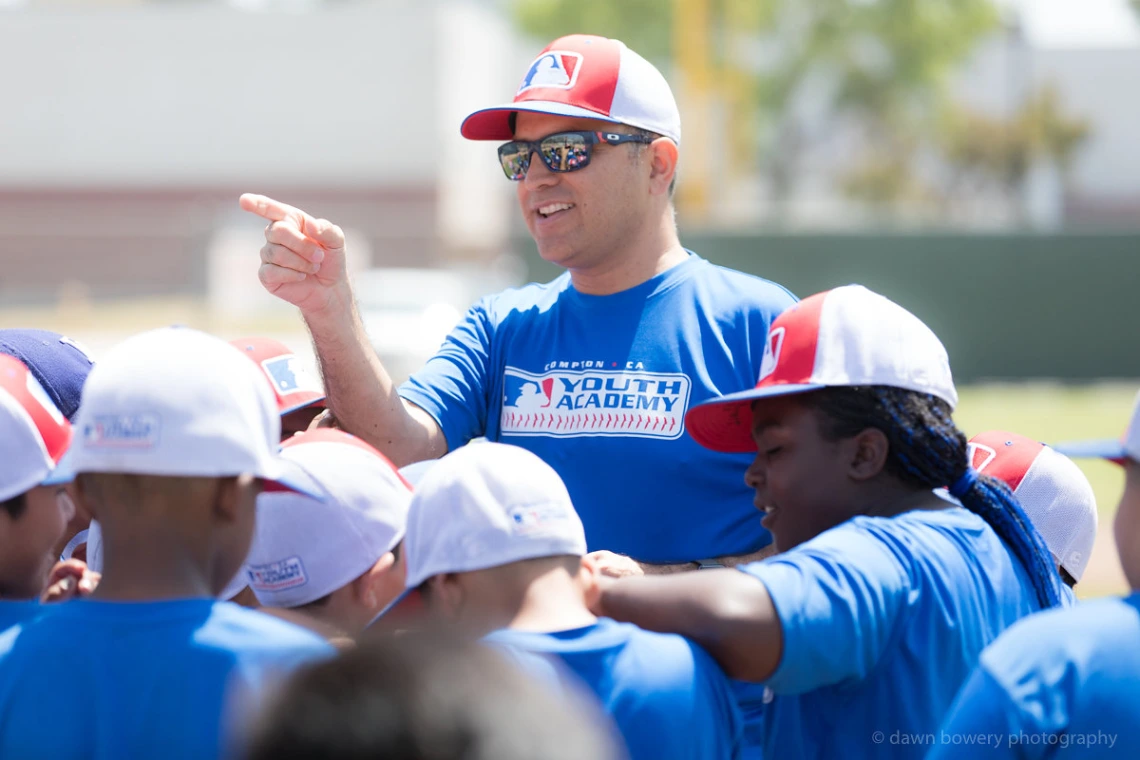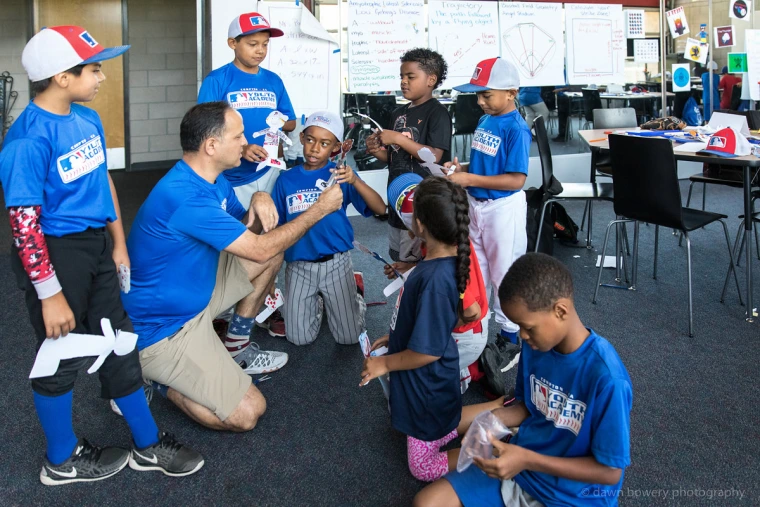For student success, Science of Sport hits a home run

Ricardo Valerdi and Science of Baseball students hit the field.
Courtesy of Ricardo Valerdi/Science of Sport
Internationally, the United States ranks 25th out of 37 nations in mathematics literacy as listed by the Organization for Economic Co-operation and Development (OECD), which works to build better policies to foster prosperity, equality, and opportunity for people around the world. In the wake of the COVID-19 pandemic, the National Center for Education Statistics reported that mathematics scores dropped significantly for the first time ever, dipping from 241 in 2020 to 234 in 2022.
University of Arizona Systems Engineering Professor Ricardo Valerdi asked questions long ago that are able to address these pressing issues: How do we create a STEM curriculum that is effective and genuinely engaging and fun for students to experience and teachers to teach?
For the love of the game – and STEM education
It all started with Valerdi’s love of engineering combined with an unquenchable affection for sports. As an innovator, he started putting ideas together, developing lessons that, for example, taught cartesian coordinates with the use of a baseball diamond, and demonstrated how to measure and calculate a strike zone. Over time, he built a complete curriculum for middle school students that promotes real-world applications of science, technology, engineering, and math principles (STEM). Eventually, in partnership with Crystal Kasnoff from the UArizona Medical Center, former president and CEO of the San Diego Padres Ballard Smith, and help from Tech Launch Arizona (TLA), the UArizona commercialization office, Valerdi founded the non-profit startup The Science of Sport and began marketing the curriculum under the name “The Science of Baseball.”

Valerdi shares his passion with students of all ages.
Courtesy of Ricardo Valerdi/Science of Sport
In 2012, the university, working with Valerdi, partnered with the Arizona Diamondbacks to create The Diamondbacks Science of Baseball, an academic curriculum for middle school students that promotes real-world applications of science, technology, engineering and math principles (STEM). Through the program, STEM teachers (grades 3-8) attend a workshop at Chase Field in Phoenix, where they learn fun ways to teach students about STEM concepts through baseball and receive instructional materials that allow them the bring the program into their classrooms. The workshops and materials are all provided to the teachers for free.
But Valerdi and the university did not stop in Arizona; they needed to expand outside of the state to create change on a large scale.
Today, Science of Sport provides programs for elementary and middle school students to improve their academic performance. The goal is to translate the familiarity of sports into an appreciation, understanding, and passion of the underlying science and mathematics.
They provide after-school programs, curriculum development, field trips, school visits, sideline chats, STEM showcases, summer camps, and teacher workshops.
To pay for the program, Science of Sport – a not-for-profit company – solicits funding from major league teams, foundations, state and federal programs, corporations, and school professional development funds. That money is used to put on STEM camps where students work through the curriculum. Schools and teachers also learn how to implement the program via “train-the-trainer” models. The company plans to target communities with professional sports teams but focus specifically on those where it can most effectively reach disadvantaged student populations.
Keeping their eye on the ball
While Valerdi and Science of Sport started with baseball, the non-profit’s expansion into other sports was key to reaching as many students in as many communities as possible.
Today, those partnerships have expanded across the nation, where communities and sports have come together to promote education to advance educational opportunities for young people. While baseball was the initial focus, over time Science of Sport has expanded its curricula to football, basketball, and soccer, all with the goal of bringing STEM education to young sports fans everywhere.
In Arizona alone, the Diamondbacks Science of Baseball Program has become that home run that Valerdi envisioned. To date, they have trained over 700 teachers and impacted the lives of over 70,000 students.
Science of Sport has gone on to form partnerships with other baseball teams, including the San Diego Padres, Anaheim Angels of Los Angeles, Los Angeles Dodgers, Oakland Athletics, Texas Rangers, Washington Nationals, Atlanta Braves, Colorado Rockies, Kansas City Royals, Chicago Cubs, and the MLB Urban Youth Academies.
Today, the non-profit has partnerships with one-third of Major League Baseball teams.
“Our goal is to reach all thirty of them,” says Valerdi.
He is thinking far outside of the baseball diamond, as well. They have added new programs such as Science of Basketball programs for NBA teams (Orlando Magic, Dallas Mavericks, and New York Knicks), Science of Soccer for MLS teams (LA Galaxy, LAFC, Houston Dynamo, and Seattle Sounders), and Science of Football (Sun Belt Conference, College Football Playoff Foundation, and Sugar Bowl).
As of now, Science of Sport has programs in 16 states across the U.S. spanning 15 sports. They have trained over 5,000 teachers and have impacted almost 500,000 youth.
Valerdi notes that this passion project started as a hobby that combined his passion for sports and STEM.
“Eventually the idea caught fire and got bigger than what I could handle, which far exceeded my expectations," he says. "I feel fortunate to be able to impact so many young people around the country. I can confidently say that the University of Arizona was the ideal launchpad for the Science of Sport because of the combination of world-class STEM programs and contagious baseball culture. This is my very own field of dreams.”

